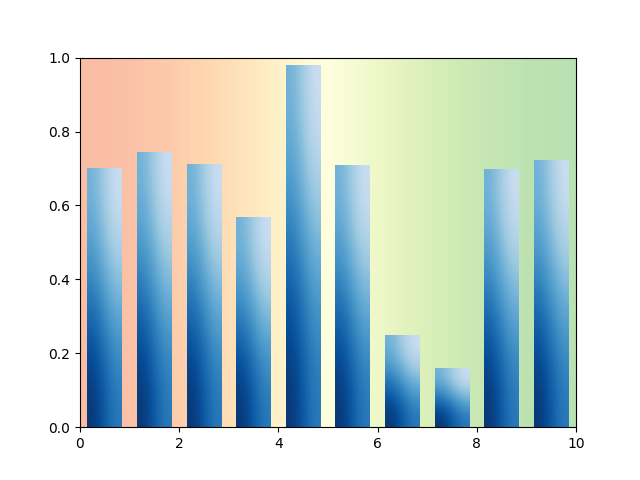ノート
完全なサンプルコードをダウンロードするには、ここをクリックしてください
グラデーション付き棒グラフ#
Matplotlib はグラデーションをネイティブにサポートしていません。AxesImageただし、適切なサイズと色を使用して、グラデーションで塗りつぶされた四角形をエミュレートできます。
特に、カラーマップを使用して実際の色を生成します。その場合、画像の隅にある基本的な値を定義し、バイキュービック補間でその領域を埋めるだけで十分です。勾配の方向を単位ベクトルvで定義します。次に、コーナーの値は、v上のコーナー ベクトルの射影の長さによって取得されます。
同様のアプローチを使用して、Axes のグラデーション背景を作成できます。その場合、Axes 座標 ( ) を使用してデータ座標から独立させると便利です。extent=(0, 1, 0, 1),
transform=ax.transAxes

import matplotlib.pyplot as plt
import numpy as np
np.random.seed(19680801)
def gradient_image(ax, extent, direction=0.3, cmap_range=(0, 1), **kwargs):
"""
Draw a gradient image based on a colormap.
Parameters
----------
ax : Axes
The axes to draw on.
extent
The extent of the image as (xmin, xmax, ymin, ymax).
By default, this is in Axes coordinates but may be
changed using the *transform* keyword argument.
direction : float
The direction of the gradient. This is a number in
range 0 (=vertical) to 1 (=horizontal).
cmap_range : float, float
The fraction (cmin, cmax) of the colormap that should be
used for the gradient, where the complete colormap is (0, 1).
**kwargs
Other parameters are passed on to `.Axes.imshow()`.
In particular useful is *cmap*.
"""
phi = direction * np.pi / 2
v = np.array([np.cos(phi), np.sin(phi)])
X = np.array([[v @ [1, 0], v @ [1, 1]],
[v @ [0, 0], v @ [0, 1]]])
a, b = cmap_range
X = a + (b - a) / X.max() * X
im = ax.imshow(X, extent=extent, interpolation='bicubic',
vmin=0, vmax=1, **kwargs)
return im
def gradient_bar(ax, x, y, width=0.5, bottom=0):
for left, top in zip(x, y):
right = left + width
gradient_image(ax, extent=(left, right, bottom, top),
cmap=plt.cm.Blues_r, cmap_range=(0, 0.8))
xmin, xmax = xlim = 0, 10
ymin, ymax = ylim = 0, 1
fig, ax = plt.subplots()
ax.set(xlim=xlim, ylim=ylim, autoscale_on=False)
# background image
gradient_image(ax, direction=1, extent=(0, 1, 0, 1), transform=ax.transAxes,
cmap=plt.cm.RdYlGn, cmap_range=(0.2, 0.8), alpha=0.5)
N = 10
x = np.arange(N) + 0.15
y = np.random.rand(N)
gradient_bar(ax, x, y, width=0.7)
ax.set_aspect('auto')
plt.show()